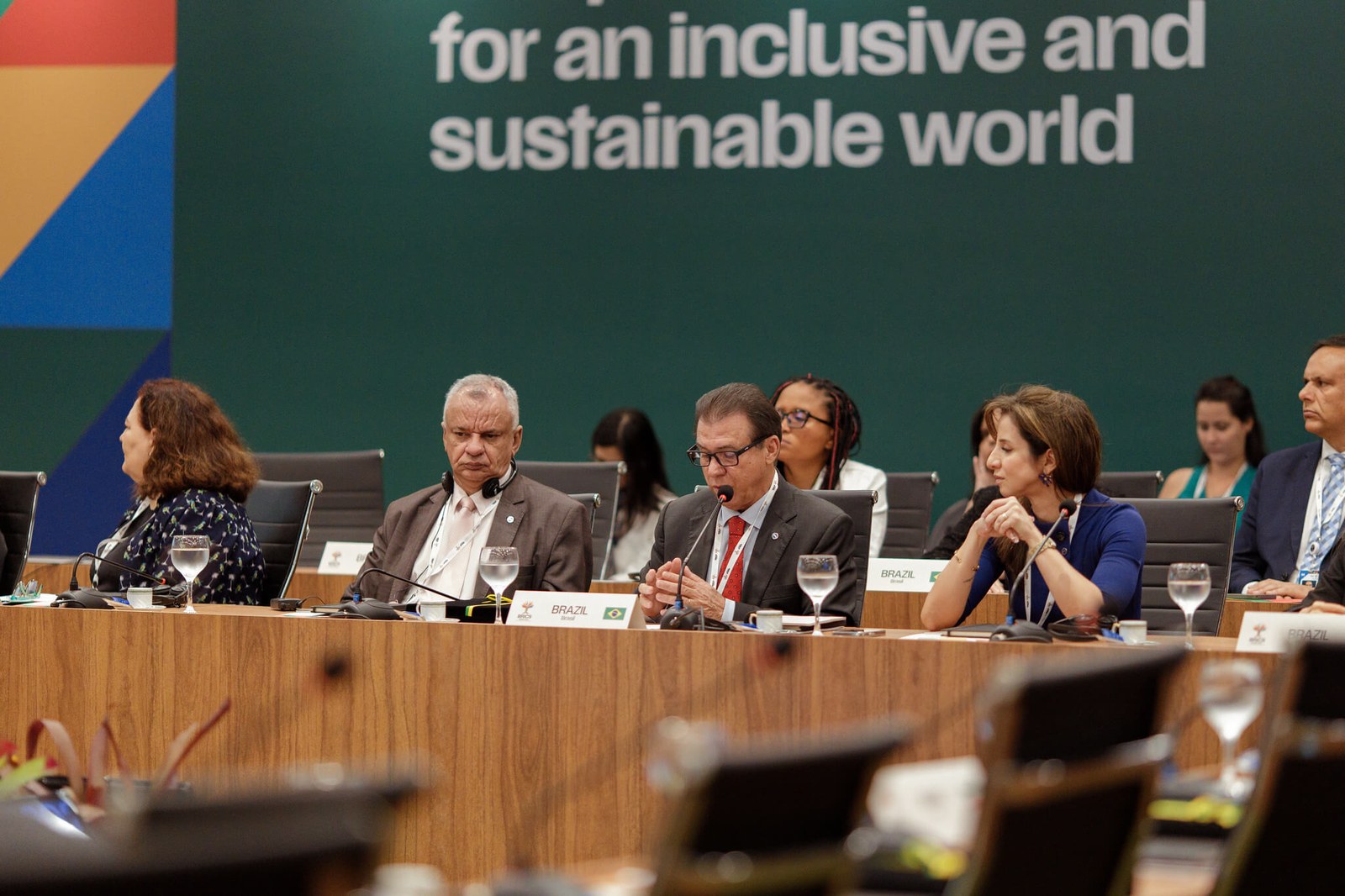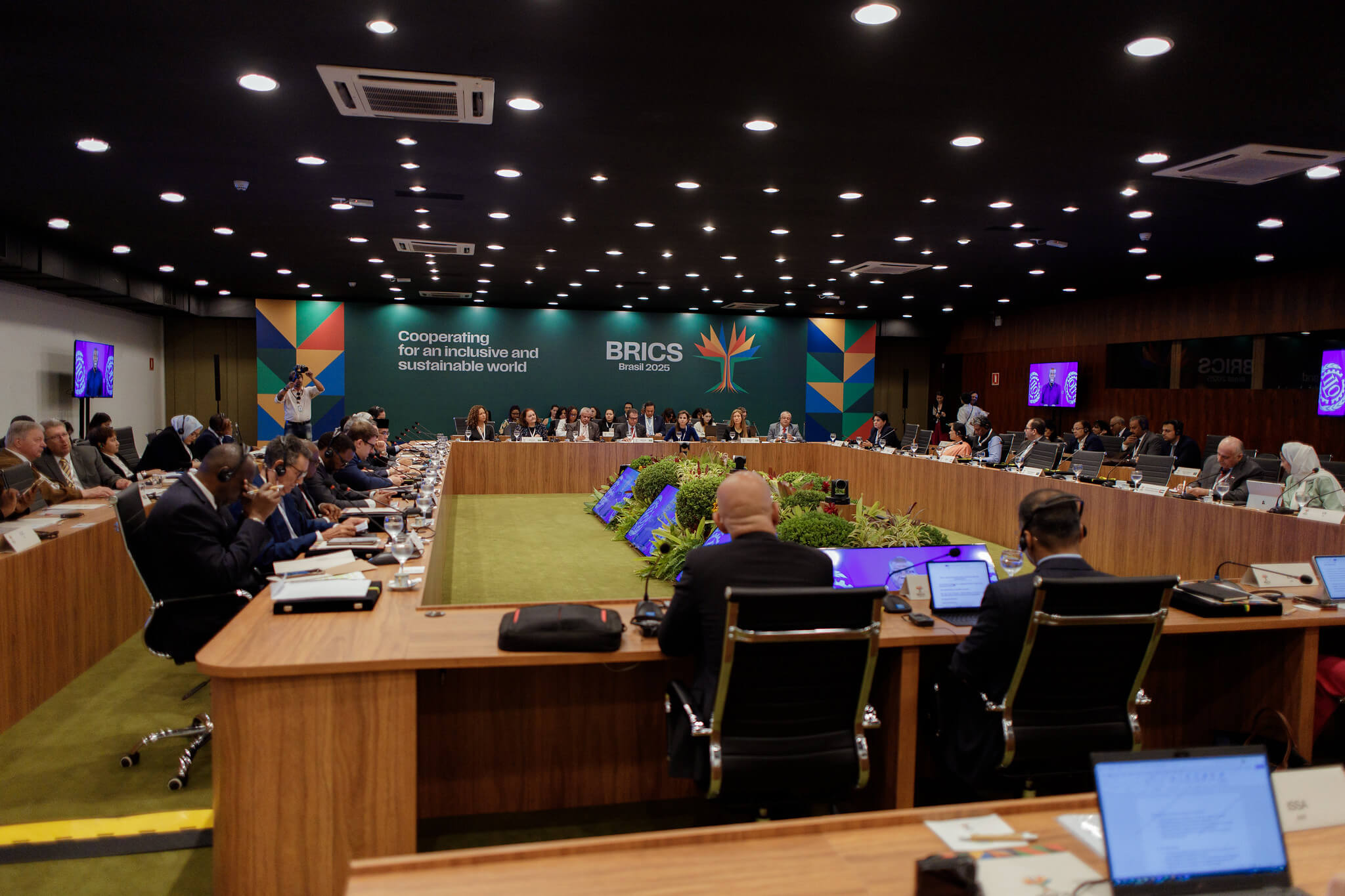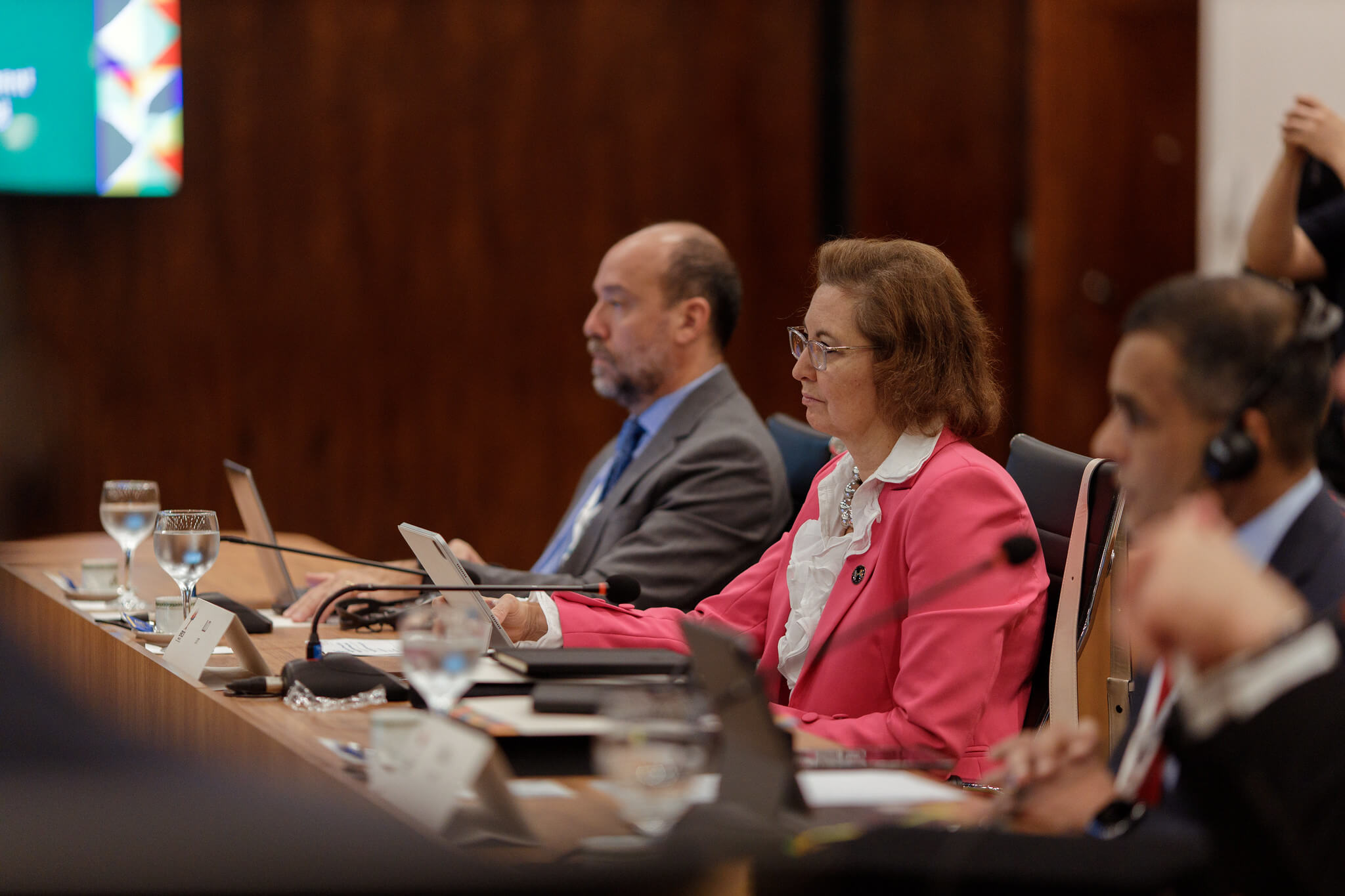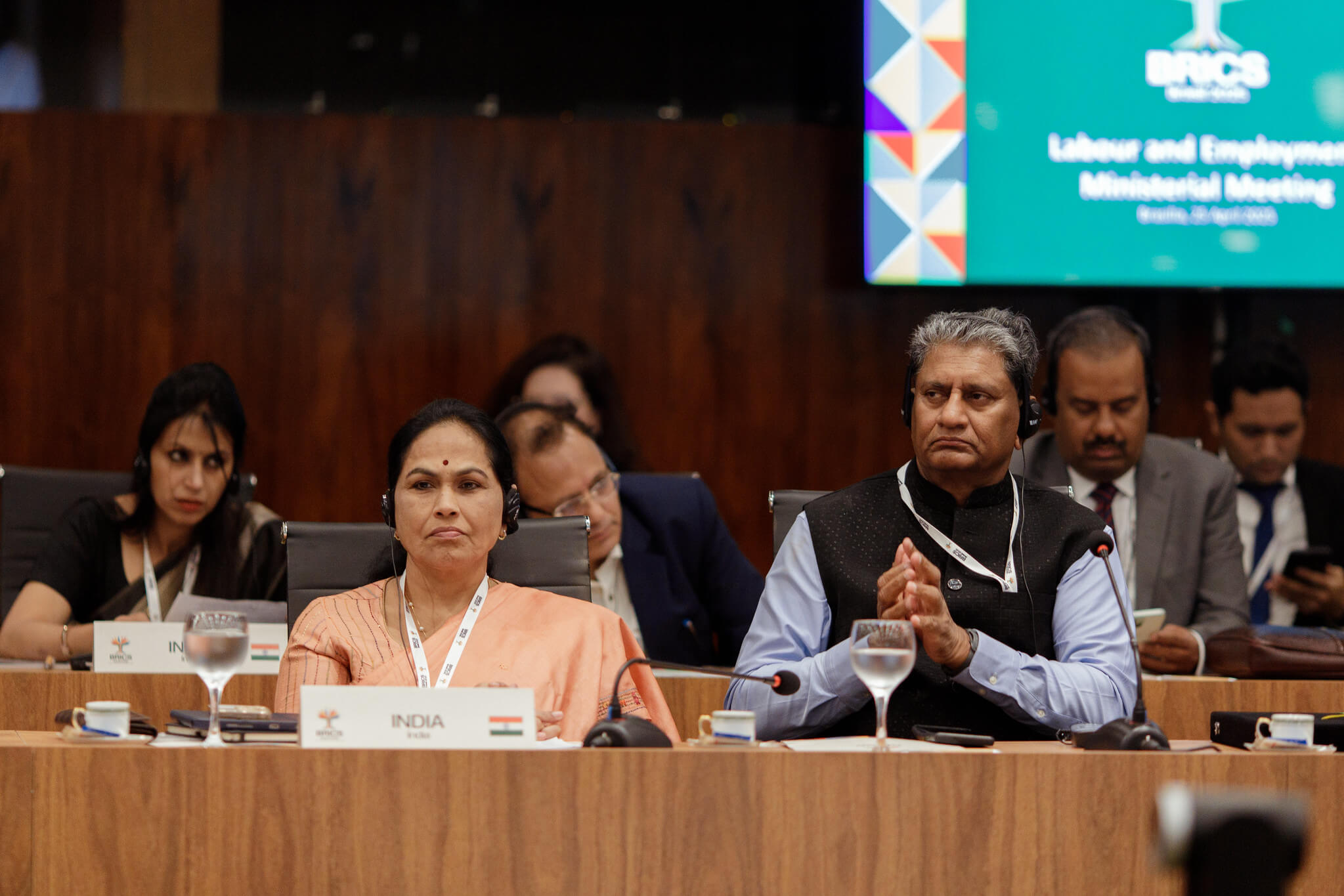Artificial intelligence and climate: BRICS declaration proposes policies to protect workers
BRICS Labor and Employment Ministers approve declaration and commit to fair work amid AI and climate change, focusing on social protection and workforce reskilling. At the ministerial meeting, Brasil leads dialogue for inclusive governance.

By Leandro Molina / leandro.molina@presidencia.gov.br
At a time of profound transformation in the world of work, the BRICS countries have taken a joint stance to ensure that technological advances and the transition to a sustainable economy do not leave workers behind. The 11th BRICS Meeting of Labor and Employment Ministers, held in Brasília, resulted in a declaration outlining a path to address the impacts of artificial intelligence and climate change on the labor market, with an emphasis on social protection and professional reskilling.
The document acknowledges that artificial intelligence is radically reshaping labor relations. While technology creates new opportunities, it also brings risks such as job displacement and growing inequalities. To address this scenario, the BRICS countries committed to adopting policies that promote a just transition, investing in the development of digital skills and protecting workers' rights. The text emphasizes that the key to this transition lies in embracing technological advancements while preserving the centrality of the human being.
Digital transformation was identified as an ally for the development of strategic sectors such as renewable energy and high-tech manufacturing. However, the ministers warned of the need to reduce asymmetries among BRICS countries, especially regarding digital infrastructure and access to education. Workforce reskilling programs and partnerships with universities and companies were highlighted as essential to prepare workers for future demands.
Vulnerable groups such as women, youth, older workers, and people with disabilities received special attention in the declaration. The ministers acknowledged that these groups are more exposed to the negative effects of automation and climate change. To support them, the group announced the creation of the BRICS Social Protection Observatory, a platform designed to promote the exchange of experiences and the alignment of public policies among member countries.
Climate change and its impacts on employment also featured prominently in the discussions. The ministers noted that the transition to a low-carbon economy could generate millions of new jobs but would require large-scale workforce reskilling. According to the document, a just transition must be socially inclusive, ensuring that workers from the most affected sectors have opportunities in emerging areas. Proposed measures include the creation of green skills programs and the adaptation of occupational safety standards to protect workers operating under extreme climate conditions.
BRICS as an Alternative in Global Governance

Brazilian Labor and Employment Minister Luiz Marinho opened the BRICS meeting in Brasília with a speech emphasizing the need for global responses to labor market challenges such as artificial intelligence and the climate crisis. The meeting was held under Brasil’s presidency of the group, under the theme "Strengthening Cooperation in the Global South for a More Inclusive and Sustainable Governance."
The minister highlighted the importance of multilateralism in addressing the impacts of artificial intelligence (AI) and the climate crisis on the world of work. "With the United States retreating from international forums, BRICS countries have a responsibility to lead fair solutions, ensuring balanced transitions—both technological and environmental—with decent pay and healthy working conditions," he stated.
The U.S. withdrawal from multilateral bodies has created a vacuum but also opened space for BRICS to assume a more active role. Marinho emphasized that, although challenging, the situation presents an opportunity to strengthen global cooperation and support international institutions. As examples of successful Brazilian initiatives, the minister highlighted the Equal Pay Law, social security and welfare policies (which have served as models for other countries), and the democratization of credit for workers, combined with professional training to meet the demands of artificial intelligence. Marinho reiterated that current transformations require collective action and affirmed that Brasil is ready to contribute with policies that combine inclusion, sustainability, and social justice.
Joint declaration with 54 points reinforces social justice
The final document, signed at the Itamaraty Palace, addresses topics such as artificial intelligence (AI), the inclusion of youth and people with disabilities, and policies for vulnerable groups. A major decision was the creation of a Policy Observatory, a platform for exchanging experiences on decent work and social protection. On April 22 and 23, representatives discussed the impacts of climate change on employment, advocating for a sustainable and inclusive transition. Regarding AI, the minister emphasized the need for regulation to prevent inequalities, with a focus on professional training and labor rights.
Data highlights BRICS importance in the global economy
International trade: 24% of the global total, with USD 210 billion in trade with Brasil in 2024 (35% of Brasil’s total trade).
Energy and resources: 43.6% of global oil production, 36% of natural gas, and 78.2% of coal.
Economic growth: All members are projected to grow in 2024, with rates ranging from 1.1% to 6.1% (IMF).
With the addition of six new countries (Egypt, Ethiopia, Indonesia, Iran, Saudi Arabia, and the United Arab Emirates), the group has expanded its geopolitical influence. The approved proposals are expected to guide public policies in member states and will be monitored by the new Observatory.
Social dialogue and global reforms
Representatives from labor unions and international organizations emphasized the need for more equitable global governance and called for the reform of institutions such as the IMF and the World Bank to address poverty and promote decent work. They also underscored the importance of climate financing and policies to prevent setbacks.
Employer representatives warned about the impacts of climate change on employment and advocated for investments in a green and digital transition. They also noted that small and medium-sized enterprises require support to transition out of informality and stressed the importance of dialogue between governments, businesses, and workers.
Betting on AI to transform the labor market

Laura Thompson, Deputy Director-General for External and Corporate Relations at the International Labour Organization (ILO), highlighted the importance of developing the skills of young people and workers to adapt to the technological landscape. She emphasized that education is crucial for development processes and commended BRICS for fostering discussions on new technologies and the protection of rights. Thompson views these meetings as an opportunity for countries to share experiences on how to better prepare their populations for the future. "You should be excited to enter a world of continuous learning and new skills. Our ability to keep learning and discovering will likely be key to truly adapting to the new reality," she said.
India’s representative, Shobha Karan Lajay, emphasized during the BRICS ministerial meeting the strategic importance of artificial intelligence for economic development and workforce preparation in response to new global demands. With 66% of its population under the age of 35, India is integrating AI across various sectors, from urban and rural areas to healthcare, agriculture, and smart cities.
"We recognize AI as a core competency for the future. We are building an economy that combines technology with critical thinking," she stated. Indian initiatives include investments in strategic sectors, rural training programs—including drone operation training—and cooperation with emerging markets, with a special focus on supporting Brazilian AI training initiatives.

The Indian representative emphasized that the country’s 800-million-strong workforce is undergoing a digital transformation. "Our labor force is no longer confined to physical borders. We are exporting skilled workers to the global market," she stated.
Lajay praised Brasil’s leadership in selecting a forward-looking theme for the BRICS presidency. "This discussion is crucial. In India, we are preparing our skilled youth not only for the domestic economy but to compete on the global stage," she concluded, reinforcing the principle that "AI must serve humanity, not the other way around."
Paula Montagner, Deputy Secretary for Labor Statistics and Studies at Brasil’s Ministry of Labor and Employment, presented a comprehensive analysis of the impacts of AI on labor markets. With expertise at the intersection of academic research and public policy, she advocated for a strategic and balanced approach.
"Artificial intelligence is a double-edged sword," Montagner explained. "While it offers speed and efficiency in solving problems, it also requires careful oversight of its effects on workers, depending on the pace of implementation and the ethical standards adopted."
Montagner emphasized the vital role of BRICS in shaping this debate. "We cannot allow the benefits of AI to be concentrated in the hands of a few. Knowledge must be democratized to ensure that no one is left behind," she stated.
She cited data estimating that approximately 2 billion workers worldwide will be affected by AI—not necessarily losing their jobs, but seeing their roles transformed. In Brasil, around 14 million formal workers, particularly in administrative sectors, are already experiencing these changes.
Montagner also highlighted the plight of gig economy workers: "In Brasil alone, over 2 million people are working under exploitative conditions, often with a lack of transparency about their earnings. Advancing regulation is crucial to ensure decent working conditions and social protection," she argued.
Brasil is among the top 15 countries with the highest scientific output on AI, hosting around 14,000 research centers dedicated to the topic. "But we must go beyond publications," Montagner warned. "The real challenge is to develop common methodologies among BRICS nations to monitor and compare AI's impacts."
Montagner concluded by emphasizing the urgency of workforce reskilling: "AI should not merely displace workers; it should generate new tasks and opportunities. Our mission is to equip workers with the tools necessary to meet these emerging demands, ensuring dignified work and fair wages."
Montagner’s remarks were part of the broader discussions at the BRICS ministerial meeting, held under Brasil’s presidency, which focused on promoting inclusive and sustainable global governance.
The declaration will be submitted for approval at the upcoming BRICS Summit. Meanwhile, member states will continue to advance initiatives such as the Decent Work Productivity Ecosystem Platform, launched in 2023, and the group’s Occupational Health and Safety Network.
The meeting concluded with appreciation for Brasil’s leadership and the confirmation that the next BRICS Labor and Employment Ministers’ Meeting will be held in 2026 in India. In an uncertain world, BRICS remains committed to fostering a fairer and more sustainable future of work through strengthened cooperation among emerging nations.